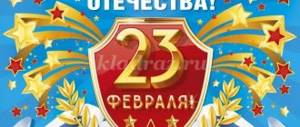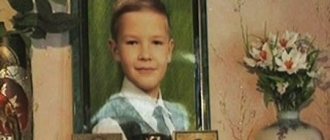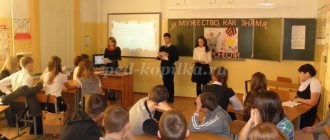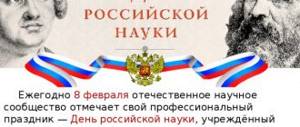Class hour - conversation in elementary school by February 23. Defenders of the Russian land
Class hour-conversation in elementary school about defenders of the Fatherland.
Author: Alla Alekseevna Kondratyeva, primary school teacher, Zolotukhinsk Secondary School, Kursk Region
“The bad people are those who do not remember, do not appreciate and do not love their history” V.M. Vasnetsov Purpose: the class hour-conversation will be useful to a wide range of readers: preschool teachers, primary school teachers, class teachers, additional education teachers, parents and simply curious people. Goal: expanding students’ horizons about the history of their Motherland, the formation and development of the Russian army, the Russian state. Objectives: 1. To strengthen children’s ideas about who the defenders of the Fatherland are. 2. Introduce students to the history of Russian soldiers and Russian officers. 3.Develop children's speech, expand their vocabulary, develop logical thinking, attention, memory, and observation skills. 4. To promote the patriotic education of students, love for the Motherland, interest in the history of their native country, its best representatives. Preliminary work: conversation about the Motherland, about soldiers, looking at illustrations, paintings about the defenders of the Fatherland, reading fiction, asking riddles, getting to know proverbs and sayings, looking at subject pictures about the branches of the military. Student: There is nothing better, more beautiful than your dear homeland! Look back at our ancestors, at the heroes of past days. Remember them with kind words. Glory to them tough fighters! Glory to our side! Glory to our antiquity! Teacher: Dear guys! Our native land is beautiful. She gives us bread and water from the springs. We admire her beauty. But she cannot defend herself. Therefore, protecting the native land is the responsibility of everyone who eats its bread and drinks its water and admires its beauty. This is a very high title - Defender of the Motherland! People have remembered the names of brave warriors for centuries. Our class hour today is dedicated to a significant date: on February 23rd we celebrate Defender of the Fatherland Day. On this day we remember and congratulate all the defenders of our Motherland: past, present and future. Today I invite you to take a short excursion into the past, “flip through the pages” of history, find out what kind of defenders of the Russian land they are? The history of the holiday Defender of the Fatherland Day Defender of the Fatherland Day has been celebrated on February 23 for almost 100 years! Initially, February 23 was celebrated as the birthday of the Red Army in honor of the victory near Narva and Pskov over German troops. Later, February 23 was celebrated annually in the USSR as a national holiday - the Day of the Soviet Army and Navy. After the collapse of the USSR, February 23 was renamed Defender of the Fatherland Day. The history of Defender of the Fatherland Day is an integral part of the history of our country. This is a real holiday of real men who are ready to stand up in defense of their Motherland at any moment. Every nation, every country has its own army. And she more than once defended her people from invaders. Our people love and appreciate Russian soldiers. Defenders of the Fatherland are warriors who defend their people, their homeland from enemies. In ancient times, in Ancient Rus', very strong people-heroes stood guard over our homeland. These are hardy and brave people. They were famous for their heroic strength; fairy tales and epics were written about their exploits. -Which heroes of Ancient Rus' do you know? (Ilya Muromets, Dobrynya Nikitich, Alyosha Popovich, Nikita Kozhemyaka...)
-Who did the Russian heroes serve?
(To the princes)
The prince needed military strength, both to ensure internal order and to defend against external enemies. The princely army was called the squad. The warriors were a real military force, always ready for battle, as well as advisers to the prince. For the combatants, war was a profession, a familiar craft. The princely squad came to him at any call from the prince. The number of the princely squad, as a rule, did not exceed ten thousand people.
Since ancient times, Russian warriors have been famous for their martial arts, courage, strength and dedication. The Slavic army was well armed, formidable and disciplined.
The warrior's weapons for hand-to-hand combat included an axe, a mace, a sword, a spear, a club, an axe, a knife and other weapons.
From throwing and small arms - bow, dart, crossbow, etc. The warrior was protected by combat armor. This is chain mail - an iron shirt made of metal rings, and on top of the chain mail noble warriors wore armor or shell made of solid metal plates. Powerful, well-trained horses also had their own armor: foreheads, breastplates. The prince was guarded in battle by a squad of the most professional warriors. As a rule, the army was commanded by a prince or governor. Grand Dukes of Rus'
Alexander Yaroslavich Nevsky (c. 1220 - 1263) - commander, prince at the age of 20 he defeated the Swedish conquerors on the Neva River (1240), and at 22 he defeated the German “dog knights” during the Battle of the Ice (1242). )
Dmitry Donskoy (1350 - 1389) - commander, prince.
Under his leadership, the greatest victory was won on the Kulikovo Field (1380) over the hordes of Khan Mamai, which was an important stage in the liberation of Rus' and other peoples of Eastern Europe from the Mongol-Tatar yoke. The first representatives of the regular troops in Rus' were called Streltsy.
Initially, the ancient Slavic word “streltsy” meant archers, who were an important part of any medieval army. The first standing army in Rus' appeared on October 1, 1550 under Ivan the Terrible. At first, the archers were recruited from the free townspeople and rural population. Subsequently, their service became lifelong and hereditary. Moscow archers guarded the Kremlin, performed guard duty, and took part in military operations. The Streltsy army was armed with squeaks, reeds, half-peaks, bladed weapons - sabers and swords, which were worn on a belt belt. Under Tsar Peter the Great, a powerful regular, that is, standing army appeared in Russia.
In this regard, the local noble militia and the Streltsy army are being liquidated. Regular infantry cavalry regiments began to form the basis of the army. The creator of the regular Russian army, Peter I, patiently and persistently called on his soldiers to subordinate all thoughts and actions to one thing - the well-being of Russia and service to the state. “Can a man who fights for his own glory, and not for the defense of the Fatherland, be a hero?” - asked Peter I.
In front of the deployed battle standards, the soldiers swore “to serve the Fatherland faithfully, obediently, to sacrifice in everything as an honest, faithful, brave soldier should be.” Throughout the history of Russia, advanced officers selflessly served the Fatherland. We have the right to be proud of the military valor of Russian soldiers. The memory of our ancestors, their deeds and achievements should live in the hearts of people.
Peter I is a Russian Tsar, an outstanding commander. He is the founder of the Russian regular army and navy. He showed high organizational skills and talent as a commander during the Azov campaigns (1695 - 1696), in the Northern War (1700 - 1721) during the Persian campaign (1722 - 1723) under the direct leadership of Peter in the famous Battle of Poltava ( 1709) the troops of the Swedish king Charles XII were defeated and captured. Alexander Danilovich Menshikov (1673 - 1729) - His Serene Highness, associate of Peter I. Generalissimo of the naval and land forces. Participant in the Northern War with the Swedes, the battle of Poltava.
Great commanders of the reign of Catherine the Great.
Participant in the Russian-Swedish war, the Seven Years' War. His biggest victories were won during the first Russian-Turkish war (1768 - 1774), especially in the battles of Ryabaya Mogila, Larga and Kagul and many other battles. The Turkish army was defeated. Rumyantsev became the first holder of the Order of St. George, 1st degree, and received the title of Transdanubian. Alexander Vasilievich Suvorov (1729-1800)
His Serene Highness Prince of Italy, Count of Rymnica, Count of the Holy Roman Empire, Generalissimo of the Russian land and naval forces, Field Marshal General of the Austrian and Sardinian troops, Grandee of the Kingdom of Sardinia and Prince of the Royal Blood (with the title "King's Cousin"), Chevalier of all Russian and many foreign military personnel orders awarded at that time. He was never defeated in any of the battles he fought. Moreover, in almost all these cases he convincingly won despite the numerical superiority of the enemy. He took the impregnable fortress of Izmail by storm, defeated the Turks at Rymnik, Focsani, Kinburn, etc. The Italian campaign of 1799 and victories over the French, the immortal crossing of the Alps was the crown of his military leadership. Great commanders of the 19th-20th centuries Fyodor Fedorovich Ushakov (1745-1817) - an outstanding Russian naval commander, admiral.
The Russian Orthodox Church canonized Theodore Ushakov as a righteous warrior. He laid the foundations of new naval tactics, founded the Black Sea Navy, talentedly led it, winning a number of remarkable victories in the Black and Mediterranean Seas: in the Kerch naval battle, in the battles of Tendra, Kaliakria, etc. Ushakov’s significant victory was the capture of the island of Corfu in February 1799 city, where the combined actions of ships and land landings were successfully used. Admiral Ushakov fought 40 naval battles. And they all ended in brilliant victories. People called him “Navy Suvorov”. Mikhail Illarionovich Kutuzov (1745 - 1813) - famous Russian commander, field marshal general, his serene prince.
Hero of the Patriotic War of 1812, full holder of the Order of St. George. He fought against the Turks, Tatars, Poles, and French in various positions, including Commander-in-Chief of armies and troops. Formed light cavalry and infantry that did not exist in the Russian army. Mikhail Bogdanovich Barclay de Tolly (1761-1818) - prince, outstanding Russian commander, field marshal general, minister of war, hero of the Patriotic War of 1812, full holder of the Order of St. George.
He commanded the entire Russian army at the initial stage of the Patriotic War of 1812, after which he was replaced by M. I. Kutuzov. In the foreign campaign of the Russian army of 1813-1814, he commanded the united Russian-Prussian army as part of the Bohemian Army of the Austrian Field Marshal Schwarzenberg. Pyotr Ivanovich Bagration (1769-1812) - prince, Russian infantry general, hero of the Patriotic War of 1812.
Prince Bagration is a descendant of the Georgian royal house of Bagration. The branch of the Kartalin princes Bagrations (ancestors of Pyotr Ivanovich) was included in the number of Russian-princely families on October 4, 1803, when Emperor Alexander I approved the seventh part of the “General Armorial”.
Time passed. The Tsar was overthrown in Russia. The Tsarist army was replaced by the Red Guard. It was generally accepted that on February 23, 1918, the Red Guard units won their first victories near Pskov and Narva over the regular troops of the Kaiser’s Germany. In 1922, this date was officially declared as “Victory Day of the Red Army over the Kaiser’s troops in Germany and the Birthday of the Red Army.”
Until February 1946, the Soviet Army was called the Workers' and Peasants' Red Army. Since 1946, February 23 has been celebrated annually in the USSR as a national holiday - the Day of the Soviet Army and Navy.
The Armed Forces of the Union of Soviet Socialist Republics were intended to protect the Soviet people, freedom and independence of the Soviet Union. By the mid-1980s, the Union Armed Forces were the largest in the world in terms of numbers. In the long-term heroic history of the Soviet Army and Navy, the number of historical victories and exploits does not know its exact number. During the Great Patriotic War, in a fierce battle with German fascism, the Soviet Army was able to defend the freedom and independence of our Motherland, saved world civilization from fascist barbarism, and provided powerful support to the liberation struggle of neighboring and European peoples at the cost of millions of lives and the broken destinies of the Soviet people. Georgy Konstantinovich Zhukov (1896-1974) - Soviet commander. Marshal of the Soviet Union, four times Hero of the Soviet Union, holder of two Orders of Victory, and many other Soviet and foreign orders and medals. In the post-war years he received the popular nickname “Marshal of Victory”. Minister of Defense of the USSR.
Konstantin Konstantinovich Rokossovsky (1896-1968) - an outstanding Soviet military leader, Marshal of the Soviet Union, Marshal of Poland. Twice Hero of the Soviet Union.
Ivan Stepanovich Konev (1897-1973) - Soviet commander. Marshal of the Soviet Union, twice Hero of the Soviet Union.
After the collapse of the Soviet Union, the date was renamed Defenders of the Fatherland Day. Since 2002, by decision of the State Duma of the Russian Federation, February 23 is a non-working day in Russia.
The Armed Forces of the Russian Federation (RF Armed Forces) is a state military organization of the Russian Federation, designed to repel aggression directed against the Russian Federation. The Russian armed forces have the world's largest stockpiles of weapons of mass destruction, including nuclear weapons, and a well-developed system of means of delivering them. The modern armed forces of Russia were created on May 7, 1992 on the basis of the former USSR Armed Forces. The Supreme Commander-in-Chief of the Russian Armed Forces is the President of Russia, Vladimir Vladimirovich Putin. In the event of aggression against Russia or an immediate threat of aggression, he introduces martial law on the territory of Russia or in its individual localities. The Russian Guard is the color and pride of the Russian Armed Forces, the personification of indestructible military power, mass heroism and military valor. Its military traditions serve soldiers as an example of loyalty to military duty and the Fatherland. Serving under the banners of the Russian Guard is both a high honor and a great responsibility.
We recommend watching:
Holiday script for primary school for Defender of the Fatherland Day Entertainment program script for primary school students for the holiday of February 23 Competitions for March 8 and February 23 for primary school Competition program for February 23 for primary school
Similar articles:
Extracurricular event on the topic: February 23, grades 3 - 4
Sports and games festival for February 23 in 2nd grade. Scenario
Competitions for February 23, 4th grade
Extracurricular event: Defender of the Fatherland Day in 2nd grade. Scenario
Sports and games festival dedicated to Defenders of the Fatherland Day for primary schoolchildren
Thematic class hours February 23 class hour on the topic
Slide 1
KNIGHT TOURNAMENT
Slide 2
ELIGIBLE ROUND – FIGHT FOR SURVIVAL WARS ARE OVER, LONG LIVE THE WORLD! THE KING OF THE CELEBRATION ANNOUNCEES AND INVITES THE VALORABLE KNIGHTS AGAIN TO THE TOURNAMENT TO SHOW OFF THEIR SKILLS.
Slide 3
What kind of person do we call a knight these days? What is military etiquette? What holiday is celebrated on February 23? Why exactly February 23? Why are the rules of conduct called ''etiquette''? Auction of ''magic'' words. Listen to couplets about ''magic'' words. Answer the question that will be asked at the end.
Slide 4
A block of ice will melt from a warm word “thank you”. The old tree stump will turn green when it hears: “Good afternoon!” If we can’t eat anymore, we’ll tell our mother: “Thank you.” A polite and developed boy says when we meet: ''Hello!'' When we are scolded for pranks, we say: ''Excuse me, please!'' In both France and Denmark, they say goodbye: ''Goodbye.'' Question: ''How many ''magic'' words were spoken?
Slide 5
I tournament Who was called a knight in the Middle Ages? a) a brave warrior b) a polite gentleman c) noble people (counts, princes, dukes) 2. Why did the custom arise when you enter a house to take off your headdress? a) to shake off the street dust b) to greet the owners c) to show respect and good intentions to those to whom he came 3. When did a book about how children should behave at the table appear in Russia, and what was it called? a) 19th century. ''Secular life and etiquette'' b) 18th century. ''An honest mirror of youth or indications for everyday behavior'' c) 16th century. ''Domostroy''
Slide 6
4. We are going to the theater. How many minutes before the start of the performance should I arrive? a) in 10 minutes b) in one hour c) in 30 minutes 5. Setting the table: on which side are the spoon and knife placed? a) both on the left b) both on the right c) spoon - on the left, knife - on the right 6. The boy shouted to a passerby: ''What time is it?'' Addressing the passerby, he made several mistakes. a) one b) two c) three (Explain what mistake or mistakes the boy made) Guests are invited for breakfast, lunch, dinner, tea or coffee, and a cocktail. Specify cocktail hour. a) 18-20 hours b) 16-17 hours c) 19-21 hours Relatives: who is brother-in-law? a) husband's father b) wife's brother c) husband's brother
Slide 7
9. You were treated to compote. How will you drink it? a) drink the liquid, and then take out the berries with a spoon b) take out the berries with a spoon, then drink the liquid c) another method So, it goes to the final round (I.F.)
Slide 8
Tournament II You have come by invitation, there are already many guests in the house: a) you will shake everyone’s hand, thereby finding out the names of the guests b) only with the hosts by hand, you will say to the rest: “Hello” c) you will say a general “Hello” ''Your mother (sister, girlfriend) has a white outfit. You choose a bag to go with your outfit: a) soft pink b) beige c) white 3. You are at the table. How do you get bread? a) with a fork from the bread bin b) with your hand from the bread bin c) another way
Slide 9
4. Guests are invited to the table. Who should sit down first? a) elderly b) young c) hostess and owner 5. In Japan, when you notice an acquaintance on the street, you greet him in a peculiar way. How? a) raise their hands and greet with a loud exclamation b) freeze in a half-bent position c) in some other way 6. You give a gift. How will you present it? a) in packaging b) without packaging, so that you can see what you are giving c) without packaging, but tied with a ribbon
Slide 10
So, he enters the final round (I.F.) You are in the theater, you don’t like the performance, your actions: a) you will doze off, but wait for a break or the end b) you will try to quietly leave the hall c) you will come up with something else 8. U grandma's birthday. The family is thinking about what to give her. We settled on three items: a) a set of cosmetics b) a set of pots c) a set of bed linen 9. For lunch, the second course was fish. How do they eat it? a) forks b) hands c) knife and fork
Slide 11
Final tournament
Slide 12
Final tournament Their eyes are brave, their hearts are hot, And their steel swords clang loudly! And the horses gallop towards you, their manes fluttering like waves. And the horsemen lead the battle dashingly, Their zealous ardor burns with fire. Banners in silks sway proudly, And eagles circle above them in the clouds! The herald hears the battle with his own eyes, The mighty armor shines. And the king wishes success to the brave knights in the tournament with a smile.
Slide 13
You are sitting at the table, they offer you a treat: a) you don’t touch it until the hosts start eating b) you wait until the other guests start eating c) you start eating without persuasion 2. At what time are you allowed to call your friends? a) from 9:00 to 22:00 b) from 6:00 to 24:00 c) from 10:00 to 18:00 3. What is appropriate to ask about at the very beginning of a telephone conversation? a) is your subscriber hungry b) does your subscriber have the time and opportunity to talk to you c) how are you doing?
Slide 14
4. How do you say your name when meeting? a) quietly, so that no one else can hear it b) very loudly, so that everyone can hear it c) say the name clearly, looking your communication partner in the eyes, so that you can be heard well 5. If you want to be given an answer, how Is it right to start the question? a) would you say…. b) don’t you know…. c) excuse me, please tell me…. 6. Two boys collided at the door and couldn’t separate. Who should give way if one is 8 years old and the other is 11 years old? a) 11-year-old b) 8-year-old c) another solution
Slide 15
7. The bell has already rung. You are late for the start of the concert. You need to go to your seat: a) you walk with your back to the seated spectators b) apologizing, sideways to the spectators c) facing the spectators 8. When we say hello, we take off our gloves, why? a) it’s a warmer handshake b) it’s not necessary to take it off c) we show respect and that there is no weapon in your hand 9. You received a box of chocolates as a gift. What will you do with it? a) show the guests a rich box b) offer it to the guests c) put it aside like other gifts
Slide 16
Knight of our time (F.I.) Love and recognition are more valuable than awards, And the ladies look with crazy delight, The riders seduce their eyes. The tournament will reward its brave man, And the lovely ladies will give hearts!!!
Slide 17
The weapon of the Knight of our time is... '' Nothing costs us so cheap and is valued so dearly as politeness.'' M. Cervantes politeness '' True politeness lies in a benevolent attitude towards people.'' J.J. Rousseau
Slide 18
List of sources https://images.yandex.ru/yandsearch?text=%D0%BA%D0%B0%D1%80%D1%82%D0%B8%D0%BD%D0%BA%D0%B8%20 %D1%80%D1%8B%D1%86%D0%B0%D1%80%D0%B8%2C%20%D1%82%D1%83%D1%80%D0%BD%D0%B8%D1 %80%D1%8B&stype=image&lr=65&noreask=1&source=wiz https://www.vestnikk.ru/dosug/legends/6353-rycarskie-turniry.html Magazine ''Class Teacher'', 1/1999 Magazine ''Vesta' ''
Slide 19
Goal, objectives Goal: to give children the opportunity to acquire socio-cultural knowledge and experience Objectives: Fostering the spirit of patriotism Formation of a moral culture Formation of a culture of joint leisure Formation of the ability to express one’s opinion and defend one’s point of view Formation of the ability to compare, analyze, compare facts in order to obtain the correct answer Formation of skills to lose and win with dignity Creating an atmosphere of mutual respect and goodwill, with the aim of uniting the team Fostering empathy and tolerance



